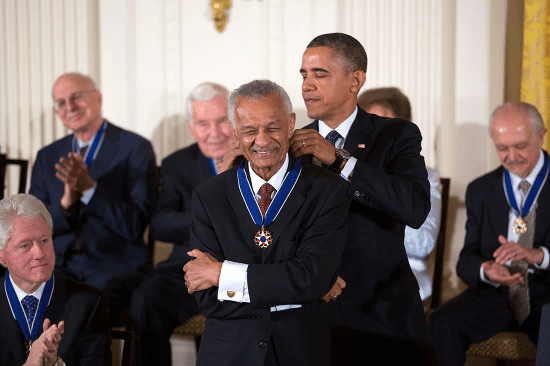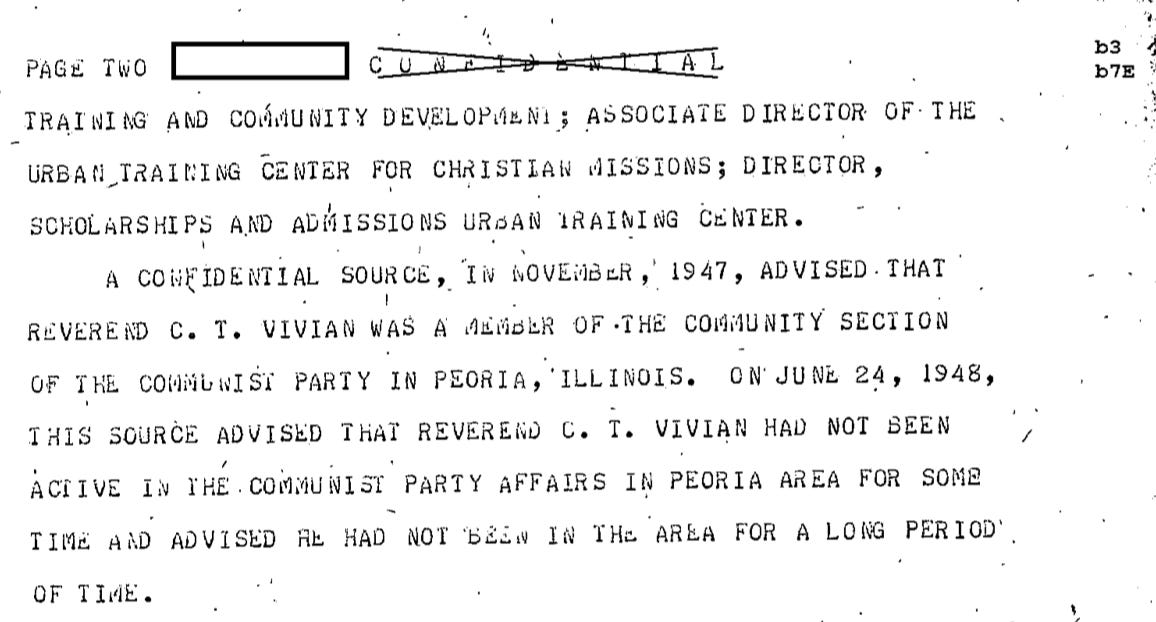Remembering a King Disciple: Cordy Tindell Vivian
Like his leader and fellow pastor, Vivian was a target of FBI surveillance

On this day, the nation will mark the life and legacy of the former co-pastor of Atlanta’s Ebenezer Baptist Church and the most well-known civil rights activist of the 20th century—the late Rev. Martin Luther King, Jr. The civil rights organization that King co-founded in the late 1950s, the Southern Christian Leadership Conference (SCLC), would not have come into being without the support of many other religious leaders who were inspired by King’s words and deeds. One of them, the Rev. Cordy Tindell "C.T." Vivian, passed away in July 2020.
Born in Boonville, Missouri on July 30, 1924, Vivian was the great-great-grandson of a former slave, Al Sampson. Vivian was raised in a family and community with a deeply held religious faith.
“We believed that somehow God was going to take care of us," he would write in his 2021 posthumously published memoir, It's In The Action: Memories of a Nonviolent Warrior. "We had to believe--because there sure wasn't much else in the country that said we should survive.” (p. 7)
By the time he encountered Martin Luther King, Jr., Vivian had earned his divinity degree and been politically active for some time. During Kennedy's administration, King asked Vivian to become SCLC's Director of Affiliate relations. The job kept Vivian on the road a lot, traveling the country to help organize protests and motivate others to join the movement and work for racial equality and equal justice under law. Like many of his colleagues, Vivian’s work on the front lines of the civil rights struggle earned him beatings and arrests at the hands of local or state police in multiple southern states, including jail time in Parchman Prison in Mississippi.
Working alongside King and a host of other civil rights leaders, Vivian would witness the passage of the Civil Rights Act and the Voting Rights Act in 1964 and 1965, respectively. But he would also live to see the murder of Malcolm X and King, as well as ongoing efforts by racist Southern politicians like George Wallace to thwart policies and laws designed to bring about genuine racial equality.
His activities also earned him the interest of the FBI.
Almost three and a half years after his death, in December 2023 the FBI quietly released slightly less than 100 pages of records mentioning Vivian on its "Vault" website. The release was made in response to Freedom of Information Act (FOIA) requests, by me and very likely several others. The material spans 1965 to 2003, with the majority of the records covering the 1969-71 period. Vivian's activities with SCLC and his own Chicago area organization, the Coalition for United Community Action (CUCA)—which was focused on securing employment for Blacks in the construction trades—are the primary subjects of the released material.
As it did with virtually every other Black civil rights leader, the Bureau trafficked in unverified confidential source allegations that Vivian had been a Communist Party-USA member as early as 1947, according to a Chicago FBI Field Office report from February 13, 1976:

The same report noted Vivian's past organization leadership positions, and stated that, "...Chicago is in possession of voluminous material regarding Rev. C.T. Vivian's past activities."

I'll be following up with the FBI to seek release of those remaining "voluminous" records that the Bureau continues to withhold from the public.
By 1970, Vivian had reached the conclusion that the civil rights movement had failed--not for lack of effort, but because of how entrenched prejudicial racial attitudes continued to hinder the cause of civil rights.
In a 1970 political memoir titled Black Power and the American Myth, Vivian's bitterness at the lack of aggressive enforcement of the Civil Rights Act and Voting Rights Act by the Nixon administration was palpable:
The Movement discovered that democracy, for all practical purposes, is not the working ideology of America. Dozens of our people lost their lives through lynchings, bombings, and murders, trying to put federal laws into effect in situations which the government was unwilling to face. When The Movement put democracy to the test, the democratic facade was quickly dropped to reveal the naked power with which the entrenched potentates guard their privilege. The real beliefs of the society were exposed beneath the superficial democratic exterior. (Kindle edition)
Despite his deep-seated anger at how little had changed in America in the early 1970s, Vivian never stopped working for real change in how the majority white population and political establishment treated Blacks. He kept speaking, organizing, and leading a number of social justice organizations. He worked for Barack Obama's election, and not long after Obama's inauguration was invited to meet with the new president.
At the meeting were Obama, First Lady Michelle Obama, Representative John Lewis (D-GA) and a number of other Black leaders. Years later, Vivian would describe the moment and his feelings in his 2021 memoir:
I got teary-eyed, right. And when he, when President Obama walked in. And see, what I was thinking about was we had Martin [Luther King, Jr.] and now we had a president, right--and what will be next? What could it be, right? But thanking the Lord, right, all the time. When you really think about how great all this is, that in a short length of time--and I didn't think we'd have a president for another hundred years. I really didn't. (pp. 125-126)
Barack Obama's road to the presidency was paved by people like C.T. Vivian, a fact I'm sure Obama appreciated as he hung the Presidential Medal of Freedom around Vivian's neck in 2013. America is a better place for King, Vivian, and others like them having lived in it. The work to create a more perfect union goes on.





